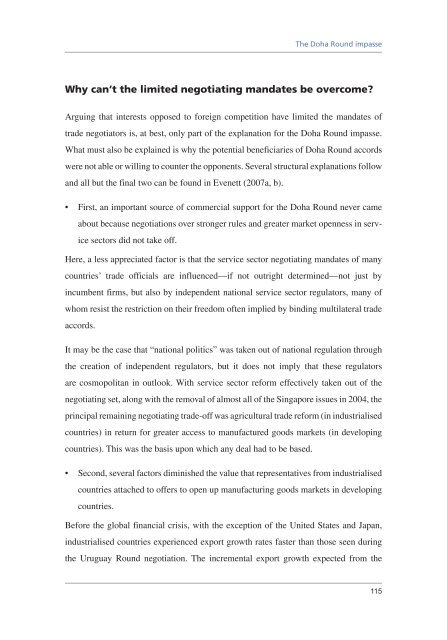Download PDF - Vox
Download PDF - Vox
Download PDF - Vox
- No tags were found...
Create successful ePaper yourself
Turn your PDF publications into a flip-book with our unique Google optimized e-Paper software.
The Doha Round impasseWhy can’t the limited negotiating mandates be overcome?Arguing that interests opposed to foreign competition have limited the mandates oftrade negotiators is, at best, only part of the explanation for the Doha Round impasse.What must also be explained is why the potential beneficiaries of Doha Round accordswere not able or willing to counter the opponents. Several structural explanations followand all but the final two can be found in Evenett (2007a, b).• First, an important source of commercial support for the Doha Round never cameabout because negotiations over stronger rules and greater market openness in servicesectors did not take off.Here, a less appreciated factor is that the service sector negotiating mandates of manycountries’ trade officials are influenced—if not outright determined—not just byincumbent firms, but also by independent national service sector regulators, many ofwhom resist the restriction on their freedom often implied by binding multilateral tradeaccords.It may be the case that “national politics” was taken out of national regulation throughthe creation of independent regulators, but it does not imply that these regulatorsare cosmopolitan in outlook. With service sector reform effectively taken out of thenegotiating set, along with the removal of almost all of the Singapore issues in 2004, theprincipal remaining negotiating trade-off was agricultural trade reform (in industrialisedcountries) in return for greater access to manufactured goods markets (in developingcountries). This was the basis upon which any deal had to be based.• Second, several factors diminished the value that representatives from industrialisedcountries attached to offers to open up manufacturing goods markets in developingcountries.Before the global financial crisis, with the exception of the United States and Japan,industrialised countries experienced export growth rates faster than those seen duringthe Uruguay Round negotiation. The incremental export growth expected from the115














